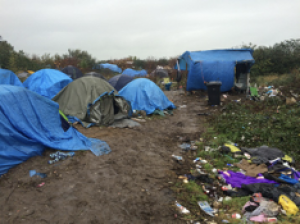Newsletters
Please select an issue from the list on the right, to view the articles which have been uploaded to the website.



By Bishop Jonathan Clark (Bishop of Croydon)
Recently Bishop Jonathan Clark (Bishop of Croydon, Diocese of Southwark) was asked if he could write something for the Fellowship - here is his article. Bishop Jonathan follows up a subject raised in Living Words some time ago which continues to impact on us in today’s disordered world.
Not looking away
Contemplative prayer is about looking. That’s what the word means. The call to contemplative prayer is to remain focused (another visual image), to bring your attention back time and again as it flits away, to that point of attention which can become the place in which we know ourselves to be seen and loved by God.
After I was asked to write this article, I did a little research of my own and came across the article in no 13 of Living Words which talked about some of the more surprising and difficult verses that Robert Coulson had used in his own prayer - verses such as “I will visit upon you the evil of your doings” (Jer 23.2 RV). As the article pointed out, these are verses “that we personally would find challenging, if not impossible, to use in our contemplative prayer time”.
Those verses are of judgment; verses which challenge our sense of ourselves as loved by God. Especially because of our own knowledge that some of our doings are indeed evil, we find it almost impossible to stay with verses like these. But if we can move in deeper, I think a verse like this can in fact take us closer to God, through the path of mourning. I’d like to invite you if you can to stay with this image in prayer.
This is a picture of the former “Jungle” Camp in Calais before its demolition. The Jungle, and other even more squalid encampments which have followed it, are our attempt to turn our collective eyes away from those who have come to Europe - some seeking asylum, some “merely” escaping from poverty.
We in the UK turn our eyes away by making it uniformly difficult for anyone to get into the country, however justified their claim might be. You can only claim asylum on UK territory - and without travel documents (which most asylum seekers won’t have, naturally) there is no legal way to get here. So people wash around our fortified borders, looking for a way in.
The Jungle was a place of squalor and desperation and danger - and also of extraordinary acts of love and mutual service. But you could only find that love, those signs of God’s presence, by staying with the ugliness and the pain. If you do not look away, but look for God here, you have no choice but to mourn the disorder in our world which has led so many people to prefer this life to the life they were leading in their countries of origin. And in that mourning you cannot help but find that you, like me, like all of us, are not separate from that disorder. We are all implicated; we are all guilty. And there is no simple, easy answer, but there is forgiveness, and so there is hope.
The prayer of contemplative mourning is not one of self-loathing. Seeing, staying with the pain of our world, and acknowledging that we are part of the cause of that pain, is also a way of opening ourselves to be a source of healing. There were extraordinary people in the Jungle, some migrants themselves, others from the UK and across Europe, who dedicated themselves to bringing what hope they could. As you all know, it is not just the active life of service which brings the love of God into the world; the contemplative life is an equally vital, if more mysterious, means of God’s grace. In the painful prayer of mourning, the healing of the world is brought nearer.
Rt Revd Jonathan Clark
Bishop of Croydon
..